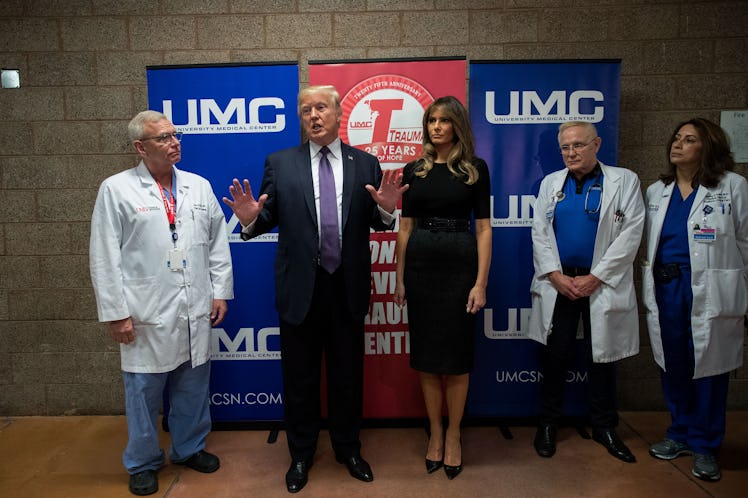
Trump Says It's Not Time To Talk About Gun Violence After Vegas Shooting
During a visit to Las Vegas, Nevada in the wake of the deadliest mass shooting in modern American history, President Donald Trump said it is not the time to discuss gun violence. Trump's Las Vegas visit, which lasted a few hours on Wednesday, Oct. 4, was closely watched as the nation saw how the man acted as "consoler-in-chief," a position he's struggled with through natural disasters this past month. But it was also closely watched as Americans look to see if gun ownership laws will change after yet another mass shooting.
On Sunday night, Oct. 1, a shooter fired at an outdoor country musical festival crowd from the 32nd floor of the Mandalay Bay Resort and Casino on the Las Vegas Strip. At least 59 people died, and over 500 were injured. As happens following most mass shootings, a debate reemerged over gun laws in the United States.
Often when this happens, however, people who do not want to see gun control tightened up say that it's not right to politicize people's deaths by talking about laws. The Trump White House appears to be following that edict. On Monday, Press Secretary Sarah Huckabee Sanders said it was "premature" to discuss gun control, adding that "there's a time and place for political debate, but now is time to unite as a country."
Sure enough, in Las Vegas on Wednesday, Trump followed in that style. After visiting the University Medical Center along with Melania and meeting with survivors, Trump spoke to the press. He began by praising the medical professionals, first responders, and survivors of the shooting.
But when a reporter asked if America has a gun violence problem, President Trump said "we're not going to talk about that today."
Trump's stance on gun control has varied a bit over the years, but now that he's a Republican, it's remained clear.
Back in 2012, following the horrific Sandy Hook Elementary School shooting, Trump said he agreed with then-President Barack Obama's call for tighter gun control laws. But as a presidential candidate, Trump both supported the National Rifle Association (NRA) and was supported by the pro-gun rights organization. Trump has continued to voice his support for gun ownership as president. In February, he revoked an Obama-era rule that made it more difficult for people with mental illnesses to buy a gun. In April, he gave a speech to the NRA, reiterating his support.
This comes in sharp contrast to the stance of Obama, who had to give at least 17 speeches over the course of his presidency following a mass shooting. These speeches all called for tighter gun control laws, but Obama was unable to achieve any of that.
On one hand, it's understandable for Trump to not want to discuss laws at a hospital.
I'm sure this was a very difficult day for the Trumps, and it's important to focus on the human lives at hand.
But on the other hand, those human lives were lost and damaged because of gun violence in America. So if now, with 59 people gunned down and more than 500 injured, isn't the right time to talk about gun violence, when, pray tell, is?
As a nation that suffers so many mass shootings, it's remarkable, in a way, that we haven't figured out a formula for when we can all agree it's appropriate to discuss gun control. If it's too soon after the Las Vegas shooting to discuss gun control, has enough time passed since 20 children were gunned down in Connecticut to talk about doing anything to stop that from happening again?
Unfortunately, the way it's looking now, not even Democrats want to try to do anything to stop that from happening again, given that they lack the Congressional majority and it hasn't been deemed necessary for reelection.
So, again, we're here: Dozens of people were killed because a man was able to get a bunch of guns, and we're not going to do anything to try and stop it from happening again.
Still, if you would like to try and ask your representative in Congress to take action on gun control to see if something will happen, you can call the Capitol switchboard at (202)-224-3121. Just be sure to not contact a representative for a state other than your own.